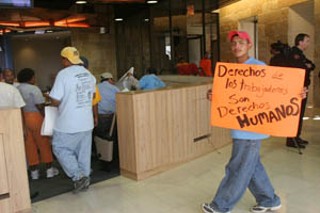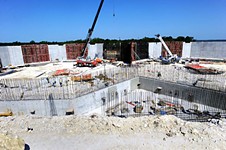Council Notes
Set in stone ... or asphalt
By Wells Dunbar, Fri., Oct. 28, 2005

Last Thursday, with the ink barely dry on that morning's agenda, the ongoing debate over the proposed Central Texas toll road study careened onto the dais. One of the council's first items was approval of an Interlocal Agreement between Austin, Round Rock, surrounding counties, the Central Texas Regional Mobility Authority, and the Capital Area Metropolitan Planning Organization – all stakeholders in CAMPO's proposed, toll road-centered, mobility plan (some holding noticeably more stake than others). Raul Alvarez had pulled the item from the consent agenda, while expressing concerns over the direction and independence of the study's steering committee. Brewster McCracken tried to sooth Alvarez concerning the study's delay, arguing that as noncity stakeholders joined what had originally been the city's get-together, the study's scope inevitably expanded. Unsoothed, Alvarez characterized the newcomers as party crashers. "We get two votes on – potentially on – what the study says and does, versus us being the managers … driving the process," he said. "It's great to be working with everyone, but it does raise some questions with me about how independent the study is going to be." Alvarez's doubts were milder versions of the outrage already expressed by toll-road opponents, most notably the Austin Toll Party's Sal Costello.
For his part, McCracken said the study and steering committee represent "the best example of [regional] cooperation in Central Texas history" – take that, Envision Central Texas – and that any fears of the study changing direction were unfounded, as its financing makes it "pretty dang near set in stone." The measure passed 6-1, Alvarez the lone wolf. "To a certain degree," he said afterward, "it's out of our hands now."
Later on, the council fussed over a yearlong agreement with Waste Management of Texas to haul trash and recyclables from city facilities and Downtown, in an area newly extended to include parts of the Warehouse District. The contract squeaked by on a 4-3 vote, with those voting nay – McCracken, Mayor Pro Tem Danny Thomas, and Lee Leffingwell – citing Waste Management's shabby environmental record at their Northeast dump site. Several speakers reminded council that WM has been fined several times in connection with the site; Robin Schneider of Texas Campaign for the Environment suggested Austin taxpayers would now effectively be underwriting an eventual "$50 million cleanup" of 21,000 toxic sludge barrels buried there. "This company is known as a bad actor," said Schneider, noting that WM has been prohibited from operating in the entire state of Indiana. "We have to be aware of the pattern, not just [at] this landfill, which has been horrendous, but across the county," Schneider said. Ultimately, such protestations weren't enough to sway one more vote, as the otherwise publicly taciturn council let this one hang all out. Betty Dunkerley, noting the contract's renewal in 12 months, called for a long-term waste management (the practice, not the company) plan to address Austin's unuseables.
Between the traffic and the trash, during Citizens Communications the council faced more immediately human concerns. Several members of the newly minted Home Depot Corner Committee spoke, with the help of an interpreter. "We want to work, we are honest workers. We need support and help from the city," day laborer Marvin Rodriguez told the council en españól. He reported the committee had conducted an informal door-to-door survey in the St. John's neighborhood (near the I-35 N. Home Depot), and found that 90% of the residents support their request for Home Depot to create a safe environment on their property for day laborers looking for work.
An APD representative recounted reports of catcalls to young girls walking across the interstate to an elementary school, along with incidents of laborers blocking nearby roadways. "Sometimes, people have said that we are delinquents or criminals, but that's not true," responded Rodriguez. Health and Human Services Director David Lurie encouraged the use of the city's First Labor site, less than two miles south at 51st and I-35, and said they are considering building another site, possibly in Southeast Austin – though that will be of little use to the controversy unfurling on St. John's. Raul Alvarez said an advisory committee to examine workers' concerns could be established rapidly, once the stakeholders have been determined. Speaking in Spanish to the laborers, he drew their applause.
Alvarez garnered applause again that afternoon with the approval of funds and construction contracts for the Mexican American Cultural Center, with Mayor Emeritus Gus Garcia in the house to observe the long-delayed start.
But the chambers were eerily quiet when Assistant City Manager Rudy Garza laid out yearlong-dormant proposed changes to Austin's public order ordinances, aimed specifically at the itinerant homeless. As Garza laid out the proposals, which would expand prohibitions on solicitation, and sitting or lying down on the sidewalk – House the Homeless President Richard Troxell and others stood quietly to one side, holding banners and signs demanding a living wage. Will Wynn, acknowledging the ordinances as "sensitive because they deal with people's civil liberties," said they are modeled after proposals elsewhere that have withstood legal challenges. Expect lots of public input today (Thursday, Nov. 27), as the ordinances are slated for public hearing at 6pm (Item 29).
Also scheduled for presentation this evening are the city staff recommendations from the African-American Quality of Life Project Implementation Team, who will present their findings from the city survey commissioned in the aftermath of the Midtown Live nightclub fire and the accompanying controversy over the city's treatment of its black citizens. (The presentation is Item 28, also "scheduled" at 6pm, but before the Public Order Ordinances.) Also on the agenda (early, Item 10) is a possible prohibition against parking cars in local front yards – soon to be known as the Softball-for-John-Kelso Ordinance. Finally, on the happy talk agenda, Item 19 is a resolution to approve a re-siting of the Austin Energy Control Center and a downsizing of the Seaholm substation – adding developable space to Austin's own front yard. Can we park our cars there?
Got something to say on the subject? Send a letter to the editor.










